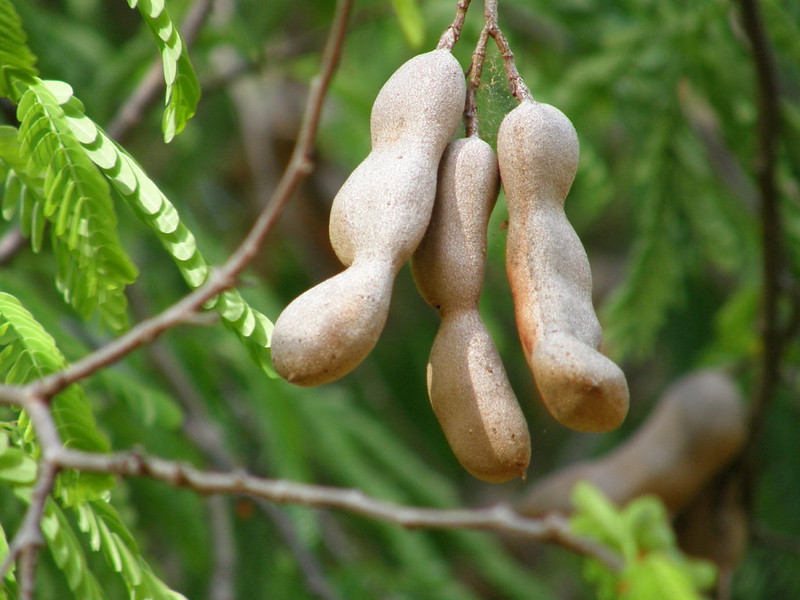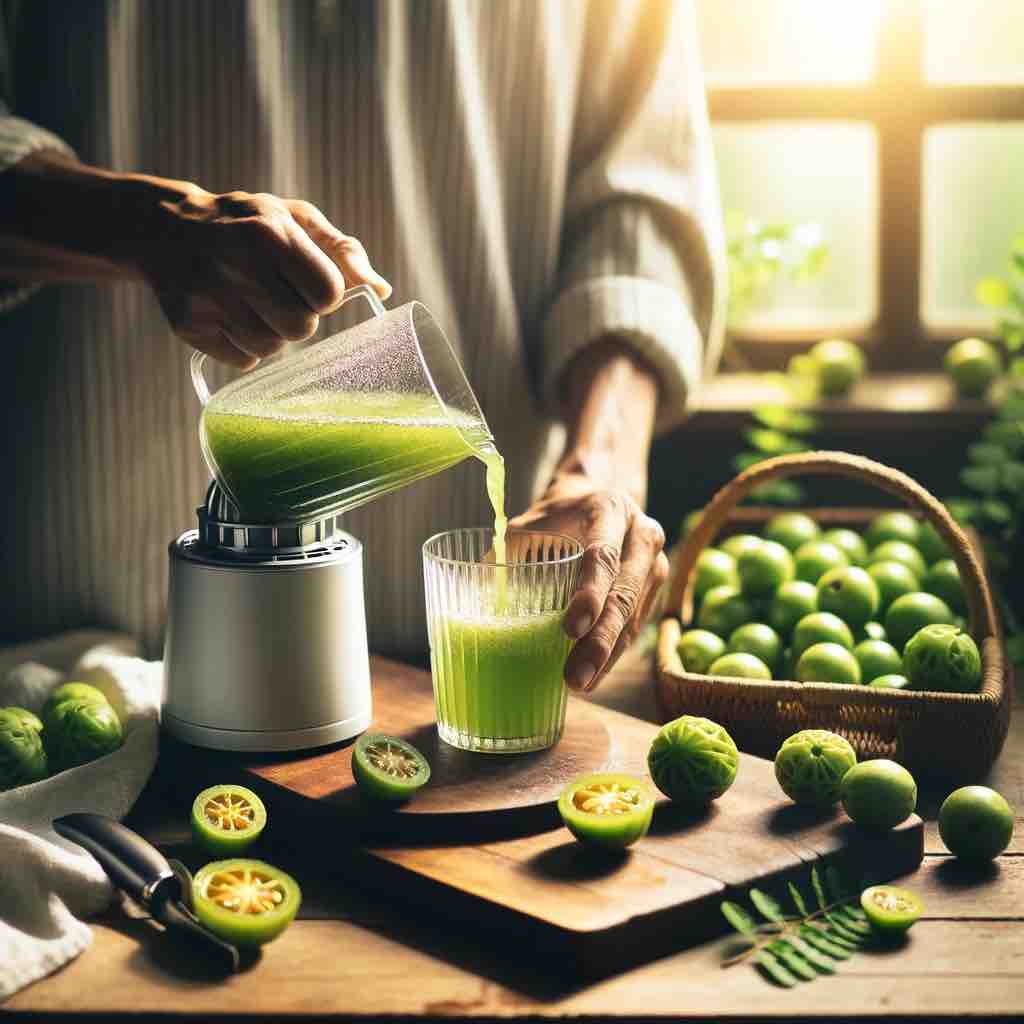
Tamarind is the mouthwatering tropical delight. It is not only a spice condiment but a folk medicine for African, Mexican, and Asians for ages. Along with fulfilling the tangy graving, tamarind provides other health benefits too.
The bean-shaped pods are full of fibrous pulp that has a tangy sweet-sour flavor. The pulpy paste is a great addition to Asian purees, dips, and curries.
And the incredible health benefits of tamarind are the cherry on top. But, you have to be careful about a few factors. (Keep reading)
Getting to the point, here’s a research-backed guide that details all you need to know about tamarind.

7 Benefits of Tamarind
Tamarind is a tropical fruit that is widely used in culinary preparations across various cuisines. Apart from its unique sweet and tangy flavor, tamarind offers several health benefits. Let’s explore some of the key benefits of tamarind:
- Rich in Antioxidants: Tamarind contains high levels of antioxidants, including vitamin C, vitamin E, and various phenolic compounds. These antioxidants help neutralize harmful free radicals in the body, protecting cells from oxidative damage and reducing the risk of chronic diseases.
- Anti-inflammatory Properties: Tamarind has natural anti-inflammatory properties attributed to its polyphenolic compounds, such as flavonoids and tannins. These compounds help reduce inflammation in the body, which is a common underlying factor in many chronic conditions, including heart disease, diabetes, and arthritis.
- Digestive Health: Tamarind has traditionally been used to support digestive health. It contains dietary fiber, which aids in regular bowel movements and prevents constipation. Tamarind also contains natural enzymes that help break down carbohydrates, proteins, and fats, promoting optimal digestion.
- Blood Sugar Regulation: Research suggests that tamarind may help regulate blood sugar levels. It contains certain compounds that can inhibit the activity of enzymes involved in carbohydrate digestion, leading to a slower release of glucose into the bloodstream. This can be beneficial for individuals with diabetes or those at risk of developing diabetes.
- Heart Health: Tamarind has potential benefits for heart health. It contains fiber and polyphenols that may help lower cholesterol levels and reduce the risk of heart disease. Tamarind also contains potassium, which is essential for maintaining healthy blood pressure levels.
- Weight Management: Due to its fiber content and ability to promote satiety, tamarind can be a helpful addition to a weight management plan. The fiber helps you feel fuller for longer, reducing overall calorie intake. Additionally, tamarind’s natural tart flavor can add depth to dishes without the need for excessive fats or sugars.
- Boosts Immunity: Tamarind is a good source of vitamin C, which plays a vital role in supporting a healthy immune system. Adequate vitamin C intake can enhance the body’s defenses against infections and promote overall well-being.
It’s important to note that while tamarind offers several health benefits, it should be consumed in moderation as part of a balanced diet. Some individuals may be allergic to tamarind or experience adverse effects, so it’s always advisable to consult with a healthcare professional before incorporating it into your diet.
Remember to join our community of food lovers at Eatlo Community to share your culinary experiences, learn new recipes, and embrace a healthy lifestyle.
is Tamarind Good for PCOS?
Tamarind may have potential benefits for individuals with polycystic ovary syndrome (PCOS), a hormonal disorder that affects many women. While tamarind itself may not directly treat or cure PCOS, it can be a beneficial addition to a balanced diet for managing certain symptoms associated with the condition. Here’s how tamarind may be helpful for individuals with PCOS:
- Blood Sugar Regulation: PCOS is often linked to insulin resistance, which can lead to elevated blood sugar levels. Tamarind has been found to have a positive impact on blood sugar regulation, potentially helping to improve insulin sensitivity. By promoting better glucose control, tamarind may indirectly support individuals with PCOS who are at risk of developing diabetes or experiencing difficulties in managing blood sugar levels.
- Digestive Health: Many individuals with PCOS struggle with digestive issues, such as bloating and constipation. Tamarind contains dietary fiber, which aids in maintaining regular bowel movements and supporting overall digestive health. Adequate fiber intake can help alleviate constipation and promote healthy gut function.
- Anti-inflammatory Properties: PCOS is often associated with chronic low-grade inflammation. Tamarind possesses natural anti-inflammatory properties, which may help reduce inflammation in the body. By lowering inflammation levels, tamarind can potentially contribute to alleviating certain PCOS symptoms and supporting overall well-being.
- Weight Management: Weight management is a key aspect of PCOS management, as excess weight can exacerbate symptoms. Tamarind, with its high fiber content, can promote satiety and help control appetite, which may be beneficial for individuals with PCOS who are striving to achieve and maintain a healthy weight.
While tamarind shows promise in supporting certain aspects of PCOS management, it’s essential to approach it as part of a comprehensive treatment plan. It’s recommended to consult with a healthcare professional or a registered dietitian who specializes in PCOS to tailor a diet plan that suits your specific needs and health goals.
Please note that individual responses to dietary changes may vary, and it’s important to monitor your body’s response to tamarind consumption. If you have any concerns or experience adverse effects, it’s best to consult with your healthcare provider.
Remember to join our community of food lovers at Eatlo Community to connect with others, share your experiences, and discover more about managing PCOS and maintaining a healthy lifestyle.
is Tamarind Good for Acidity?
Tamarind may offer some relief for individuals experiencing acidity or acid reflux. While it is not a cure for the underlying causes of acidity, tamarind’s natural properties can help alleviate symptoms. Here’s how tamarind can potentially be beneficial for acidity:
- Alkalizing Effect: Despite its tangy taste, tamarind has an alkalizing effect on the body. It contains potassium, which can help neutralize excess stomach acid and reduce acidity levels. Consuming tamarind may help balance the pH levels in the stomach, providing relief from acidity.
- Digestive Aid: Tamarind contains natural digestive enzymes, such as amylase and lipase, which assist in breaking down food and promoting better digestion. By improving digestion, tamarind may reduce the occurrence of acid reflux and minimize the chances of acid regurgitation.
- Soothing Properties: Tamarind has traditionally been used to soothe digestive discomfort. It contains compounds that can help calm inflammation in the digestive tract, potentially providing relief from acid-related symptoms.
- Fiber Content: Tamarind is rich in dietary fiber, which can aid in regulating bowel movements and preventing constipation. By promoting regularity, fiber can help prevent the buildup of gas and reduce the chances of acid reflux.
While tamarind may be helpful in managing acidity, it’s important to note that individual responses can vary. If you experience chronic or severe acidity symptoms, it’s advisable to consult with a healthcare professional to determine the underlying cause and develop a comprehensive treatment plan.
Additionally, it’s essential to consume tamarind in moderation and observe your body’s response. Excessive consumption or sensitivity to tamarind may exacerbate acidity symptoms in some individuals.
Can Tamarind Help Reduce Belly Fat?
Tamarind alone cannot directly reduce belly fat. However, incorporating tamarind as part of a balanced diet and healthy lifestyle may support weight management, which can contribute to reducing overall body fat, including belly fat. Here’s how tamarind can potentially aid in weight management:
- Fiber Content: Tamarind is a good source of dietary fiber. Consuming foods rich in fiber can help you feel fuller for longer, reducing overall calorie intake. By promoting satiety, tamarind can assist in controlling portion sizes and preventing overeating, which may indirectly contribute to weight loss, including reduction in belly fat.
- Low-Calorie Option: Tamarind is relatively low in calories compared to other snack options. Choosing tamarind as a healthier snack alternative to high-calorie, sugary snacks can aid in calorie control and support weight management efforts.
- Hydration: Tamarind has natural hydrating properties. Staying well-hydrated is essential for maintaining overall health and supporting weight management. By replacing sugary beverages with hydrating options like tamarind-infused water or unsweetened tamarind juice, you can reduce calorie intake and promote healthy hydration habits.
- Flavor Enhancement: Tamarind’s unique tangy taste can add depth of flavor to dishes without the need for excessive fats or sugars. By incorporating tamarind in your cooking, you can enhance the taste of meals and potentially reduce the reliance on calorie-dense flavor enhancers.
It’s important to remember that reducing belly fat requires an overall healthy lifestyle approach, including regular exercise, balanced nutrition, and portion control. Incorporating tamarind into a well-rounded, calorie-controlled diet can be a part of a comprehensive weight management plan.
It’s always recommended to consult with a healthcare professional or registered dietitian before making any significant changes to your diet or weight loss regimen, especially if you have specific health concerns or medical conditions.
Remember to join our community of food lovers at Eatlo Community to connect with others, share your experiences, and discover more about healthy eating and weight management.
Is Tamarind a Blood Thinner?
Tamarind does possess certain properties that may have a mild blood-thinning effect. It contains compounds called coumarins, which are known for their anticoagulant properties. However, it’s important to note that the blood-thinning effect of tamarind is relatively mild compared to prescribed anticoagulant medications. Here’s what you need to know:
- Coumarins: Tamarind naturally contains coumarins, which have been found to have anticoagulant activity. Coumarins work by inhibiting the activity of certain enzymes involved in blood clotting. This can potentially prevent excessive clotting and promote healthy blood flow.
- Mild Blood-Thinning Effect: The blood-thinning effect of tamarind is not as potent as that of prescription blood thinners like warfarin or aspirin. It is generally considered to have a mild impact on blood clotting.
- Consult with Healthcare Professional: If you are taking prescription blood-thinning medications or have a bleeding disorder, it is essential to consult with your healthcare professional before incorporating tamarind into your diet. They can provide personalized guidance based on your specific medical condition and medication regimen.
- Moderation and Balance: As with any food or supplement, moderation is key. Consuming tamarind in moderate amounts as part of a balanced diet is generally considered safe for individuals without underlying medical conditions. However, excessive consumption may lead to potential side effects, including an increased risk of bleeding.
It’s crucial to remember that individual responses to tamarind consumption can vary, and the blood-thinning effect may not be significant enough to replace prescribed anticoagulant medications. It is always advisable to consult with your healthcare professional before making any changes to your medication or diet regimen.
If you have concerns about blood clotting or related conditions, your healthcare professional can provide you with specific guidance based on your medical history and current health status.
Tamarind Water Benefits
Tamarind water, also known as tamarind-infused water or tamarind decoction, offers several potential health benefits. It is a refreshing beverage made by soaking tamarind pulp or pods in water and extracting its flavors. Here are some of the benefits of tamarind water:
- Hydration: Tamarind water is an excellent way to stay hydrated. It provides a flavorful alternative to plain water, making it more enjoyable to consume and encouraging adequate fluid intake throughout the day.
- Vitamin C: Tamarind is a good source of vitamin C, and when infused in water, it imparts this essential nutrient to the beverage. Vitamin C plays a crucial role in supporting a healthy immune system, promoting collagen synthesis, and acting as an antioxidant.
- Digestive Health: Tamarind has traditionally been used to support digestive health. Tamarind water can aid in digestion, relieve indigestion, and alleviate symptoms of constipation. It contains natural enzymes and dietary fiber that promote healthy bowel movements and support overall gut health.
- Antioxidant Activity: Tamarind is rich in antioxidants, including polyphenols and flavonoids. These compounds help protect the body’s cells from oxidative stress caused by harmful free radicals. Regular consumption of tamarind water can contribute to overall antioxidant support and help maintain cellular health.
- Satiety: Tamarind water can help promote a feeling of fullness or satiety, which may be beneficial for weight management. The fiber content in tamarind can contribute to increased satiety and reduced calorie intake, aiding in portion control and healthy eating habits.
- Refreshing Flavor: Tamarind water has a unique sweet and tangy taste that can be incredibly refreshing, especially during hot weather. It serves as a flavorful alternative to sugary beverages, helping to reduce overall sugar consumption.
To prepare tamarind water, soak tamarind pulp or pods in water for a few hours, then strain the liquid to remove any solids. You can adjust the concentration of tamarind to suit your taste preferences.
It’s important to note that while tamarind water offers potential health benefits, moderation is key. Excessive consumption of tamarind water may lead to increased sugar intake or digestive discomfort in some individuals.
Remember to join our community of food lovers at Eatlo Community to connect with others, share your experiences, and discover more about incorporating tamarind water and other healthy beverages into your daily routine.
Please do have a look of our wide variety of products prepared using Tamarind:
Kacha Aam Bombs
Spicy Tangy Imli Aam Papad
Homemade Khatta Aampapad
Homemade Meetha Aam Papad


Nutritional Value of Tamarind
A 100g of tamarind offers 2.3g protein, 5.1g fiber, 62.5g carbs, and only 0.6g niacin. Additionally, it’s an amazing source of vitamin A and C, iron, folate, and niacin.
Also, tamarind offers about 92mg of magnesium, 628mg of potassium, and 74mg of calcium. Isn’t it a nutrient powerhouse?
Let’s explore what this natural package of nutrition has in store for your health:
1. Loads of Antioxidants
The devour-worthy pulp is a powerhouse of antioxidants. Tamarind is full of phytonutrients-the health-protective compounds that are heart-healthy, anti-cancerous, and anti-diabetic.
Its phytonutrients such as catechin, epicatechin, apigenin, and procyanidin B2 combat free radicals in your body. These along with tartaric acid are effective in preventing inflammatory response and, in turn, oxidative stress.
Other than that, tamarind also contains geraniol which prevents pancreatic cancer.
2. Anti-cancerous Properties
Tamarind contains phytonutrients and tartaric acid. They lower oxidative stress and prevent chronic cancer. It also contains the naturally-occurring compound geraniol which prevents pancreatic cancer.
An animal study analyzing tamarind seed extract found that tamarind blocks the cancer cell’s signal pathway.
3. Heart-Healthy Pulp
Tamarind is rich in potassium, high fiber, flavonoids, and antioxidants. An animal study confirms that tamarind pulp reduces bad cholesterol. It also improves good cholesterol and decreases triglyceride levels.
The pulp is vital for removing fat plaques built up in arteries that increase the risk of atherosclerosis.
Research also concluded that tamarind aids in lowering diastolic blood pressure. Thanks to a whopping 753mg of potassium that’s an amazing vasodilator. It helps the vessel to dilate and relax to maintain normal blood pressure.
What’s more? The anti-inflammatory anti-oxidative power of tamarind prevents inflammations in arteries and heart chambers.
4. Hepatoprotective Properties
Tamarind pulp extract has liver-protective properties due to its high antioxidant count. Particularly, procyanidins protect the liver from oxidative damage.
You can lower the risk of fatty liver disease by adding tamarind to your diet, reports ScienceDirect.
Please do have a look of our wide variety of products prepared using Tamarind:
Gur Mirch Pickle
Rhododendron Chutney (Buransh)
Peri Peri Masala
Karuveppilai Podi~Homemade Curry Leave Podi/Powder
Imli Ka Amlana
5. Promotes Weight Loss
Tamarind is a perfect add-on to your quick weight-loss diet. It contains hydroxycitric acid (HCA) that can trim the fat. A recent study found that tamarind inhibits trypsin, which helps reduce food cravings.
It has also been proven that tamarind naturally boosts your serotonin levels. It is effective in curbing appetite and helps you burn more fat.
6. Improves Muscle and Nerve Functions
Tamarind is rich in vitamin B. Thiamine is an important component of vitamin B-complex. It enhances nerve and muscle functions by improving reflux actions.
The research found that xyloglucan in tamarind aids in the growth of healthy brain cells and spinal cells. It shows how tamarind cravings in pregnancy are helping you and your unborn child.
7. Boosts Digestive Health
Tamarind acts as a natural laxative. It helps to treat and even prevents both diarrhea and constipation. It works by stimulating gastric juices that help improve your digestion.

How to Add Tamarind to Your Diet?
Tamarind paste is used in sauces, dips, curries, marinades, and other Asian dishes.
To use, take a compressed block of tamarind and soak it in lukewarm water for 10 minutes. Strain it and use the liquid to prepare tamarind juice. Add 15ml of tamarind juice to 4-6 tbsp. of lukewarm water to prepare tamarind concentrate. You can add this to flavor rice, fish, meat, and more.
Tamarind concentrate can also use to prepare tropical drinks.
Is Tamarind Safe for Everyone?
Tamarind is generally safe for most people when consumed in moderation as part of a balanced diet. It is widely used as a culinary ingredient and has been consumed for centuries without any significant safety concerns.
However, as with any food, individual reactions can vary. Some people may be allergic to tamarind or have sensitivities to it. If you have known allergies or sensitivities to tamarind or related ingredients, it’s best to avoid consuming it.
Additionally, if you have any underlying health conditions or are taking medications, it’s always a good idea to consult with your healthcare provider before making significant changes to your diet. They can provide personalized advice based on your specific health needs and potential interactions with medications.
Pregnant and breastfeeding women should also exercise caution and consult their healthcare provider before consuming tamarind, as there is limited research on its safety in these populations.
Overall, tamarind is considered safe for most people when consumed in moderation, but it’s always best to consult with a healthcare professional if you have any concerns or specific health conditions.
How Much Tamarind is Safe to Eat?
In order to reap the benefits of tamarind properly, it is recommended to eat only 10gm of Tamarind in a day to keep fluoride intake within limits.
Final Verdict
Munch on tamarind for weight loss, digestive benefits, heart health, and whatnot. Enjoy tamarind, an appetizing pulpy delight without guilt (but within safe limits).
7 Health Benefits of Tamarind During Pregnancy, click here
Read 7 Medical Health Benefits of Turmeric, click here
10 Health Benefits of Coriander seeds, click here
For videos related to Health and Wellness, Subscribe to our YouTube Channel:
Masala Monk – The Gourmet Store
Please do have a look of our wide variety of products prepared using Tamarind:
Kacha Aam Bombs
Spicy Tangy Imli Aam Papad
Homemade Khatta Aampapad
Homemade Meetha Aam Papad
Gur Mirch Pickle
Rhododendron Chutney (Buransh)
Peri Peri Masala
Karuveppilai Podi~Homemade Curry Leave Podi/Powder
Imli Ka Amlana
FAQs
1. What is Tamarind, and What Does it Taste Like?
Tamarind is a tropical fruit that grows in pod-like structures filled with a tangy, sweet-sour pulp. Common in African, Mexican, and Asian cuisines, tamarind offers a unique flavor often described as a blend of lemony acidity and sweet molasses. This complex taste makes tamarind popular in cooking, especially in sauces, chutneys, and marinades. Additionally, tamarind has been valued in traditional medicine for its health benefits and digestive properties.
2. What are the Key Health Benefits of Tamarind?
Tamarind is rich in antioxidants like vitamins C and E and polyphenols that help fight oxidative stress, potentially reducing the risk of chronic diseases. It has anti-inflammatory properties that may benefit conditions like arthritis and heart disease. Tamarind also supports digestive health, blood sugar regulation, immune function, and weight management. However, individual results may vary, and tamarind should be enjoyed in moderation within a balanced diet.
3. Can Tamarind Help with Weight Loss?
Yes, tamarind can support weight management due to its fiber content, which promotes satiety and reduces overall calorie intake. Tamarind also contains hydroxycitric acid (HCA), a compound that may inhibit fat-storing enzymes and help control food cravings by increasing serotonin levels. While tamarind alone isn’t a weight-loss solution, including it as part of a balanced diet may complement weight-loss efforts, especially when combined with regular physical activity.
4. Does Tamarind Aid in Digestion?
Tamarind is known for its positive impact on digestion. The dietary fiber in tamarind aids in regular bowel movements, preventing constipation. It also contains natural enzymes like amylase and lipase, which assist in breaking down carbohydrates, proteins, and fats, promoting better digestion. Many cultures use tamarind to soothe digestive discomfort, bloating, and occasional constipation.
5. Is Tamarind Safe for People with Diabetes?
Tamarind may benefit people with diabetes by helping regulate blood sugar levels. Certain compounds in tamarind can slow the digestion of carbohydrates, leading to a more gradual release of glucose into the bloodstream. This effect may help manage post-meal blood sugar spikes. However, it’s essential for individuals with diabetes to consult their healthcare provider before incorporating tamarind, as results can vary, and excessive consumption may affect blood sugar control.
6. Is Tamarind Good for PCOS Management?
Yes, tamarind may provide supportive benefits for individuals managing polycystic ovary syndrome (PCOS). Tamarind’s potential to improve blood sugar regulation may help combat insulin resistance—a common issue in PCOS. Its anti-inflammatory properties may alleviate some symptoms, while the fiber content supports digestive health and satiety, which can aid in weight management. However, tamarind should be part of a comprehensive treatment plan developed with a healthcare professional.
7. How Can Tamarind Help with Heart Health?
Tamarind contains potassium, fiber, and polyphenols, which are beneficial for heart health. The potassium in tamarind helps regulate blood pressure, while the fiber aids in lowering cholesterol levels. Tamarind’s antioxidants may also protect blood vessels from inflammation and oxidative stress, reducing the risk of heart disease. Studies suggest that tamarind may help reduce bad cholesterol (LDL) while increasing good cholesterol (HDL), supporting overall cardiovascular health.
8. Is Tamarind Effective in Reducing Belly Fat?
While tamarind itself doesn’t directly reduce belly fat, it can aid in weight management, which may contribute to reducing body fat over time. Tamarind’s high fiber content promotes fullness and controls appetite, which can prevent overeating. Additionally, its low-calorie, nutrient-dense profile makes it a great addition to a balanced diet focused on weight loss and body fat reduction.
9. Can Tamarind Help with Acid Reflux or Acidity?
Yes, tamarind may help with acidity and acid reflux symptoms due to its alkalizing effect. Despite its tangy taste, tamarind’s potassium content can help neutralize excess stomach acid, providing relief from symptoms of acidity. Its fiber content and natural digestive enzymes also aid digestion, reducing the likelihood of acid reflux. However, if you have chronic acid reflux, consult your healthcare provider before using tamarind for relief.
10. Does Tamarind Act as a Blood Thinner?
Tamarind contains natural compounds called coumarins, which have mild blood-thinning properties. This anticoagulant effect may help prevent excessive blood clotting and support circulation. However, tamarind’s effect is much milder than prescription blood thinners, and it should not replace medical treatment for individuals on anticoagulant medications. If you have a bleeding disorder or are taking blood-thinning medications, consult your doctor before consuming tamarind regularly.
11. What are the Nutritional Benefits of Tamarind?
Tamarind is rich in nutrients, providing fiber, vitamin C, B vitamins (such as thiamine), and minerals like potassium, magnesium, and calcium. It also contains antioxidants like polyphenols, which can protect cells from damage. Per 100 grams, tamarind offers around 2.3 grams of protein, 5.1 grams of fiber, and a low amount of fat, making it a nutritious addition to a balanced diet.
12. How Should Tamarind be Added to a Diet?
Tamarind can be used in various forms, such as tamarind paste, concentrate, or as a base for drinks and sauces. To make tamarind juice, soak a compressed block of tamarind in lukewarm water, strain, and use the liquid as a flavoring. Tamarind paste is also popular in Asian dishes, including curries, chutneys, and marinades. For a refreshing twist, try adding tamarind to tropical drinks or using it as a tangy marinade for meats and fish.
13. Is Tamarind Safe for Everyone?
Generally, tamarind is safe when consumed in moderation. However, some individuals may be allergic or sensitive to it. Pregnant or breastfeeding women should consult their healthcare provider before consuming tamarind, as research on tamarind’s safety for these populations is limited. Individuals on medications, especially blood thinners, should also check with their doctor due to tamarind’s mild anticoagulant effect.
14. How Much Tamarind is Safe to Eat Per Day?
It’s generally advised to consume tamarind in moderation. Around 10 grams of tamarind per day is often sufficient for health benefits without excessive fluoride intake, as tamarind can affect fluoride levels in the body. Always consider personal tolerance levels, and consult a healthcare provider if unsure about the right amount for your needs.














